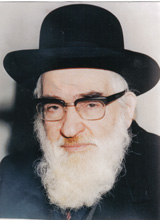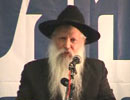The Torah study is dedicatedin the memory of
Gila bat Rachel
595
Tikkunei HaZohar explains that Purim was named specifically after the Pur , or lot, and not after any other aspect of the holiday, in order to hint at the connection between Purim and Yom HaKippurim (Ki-purim = "like Purim" in Hebrew), that, in the future, will be transformed from a day of self-affliction to a day of joy. This likening of Yom HaKippurim to Purim indicates that just as Yom Kippur is a day of drawing near to the Almighty, a day of repentance and mending the past, so is Purim a day of self-renewal and purification, a day that transforms us into new people. What's more, according to Tikkunei HaZohar, not only is it possible to draw similarities between Purim and Yom HaKippurim, but Purim is even greater than Yom HaKippurim. On Yom Kippur the process of repentance is achieved through separation from this world. It is a day of complete self affliction and withdrawal from the world. Yet on Purim our repentance includes and involves this world. On Purim we manage to partake in the pleasures of this world, while maintaining the level of purity of Yom Kippur.
The sages understood from the wording of the Scroll of Ester that initially there was a desire that Purim be established as a holiday just like any other full-fledged Jewish holiday, i.e. that all forms of labor be forbidden therein. Yet, in the end, such a proposal was not accepted. Instead, Purim was established as a day of joy and thanksgiving. On Sabbath and other holidays our bliss stems from the fact that we sever our bond with this world, turning to spiritual matters. Preoccupation with labor stifles the spirit. On other holidays we find ourselves outside of the realm of normal life, outside of the natural order. This finds expression in Hallel which is read on these holidays. On Purim, though, our joy does not derive from any sort of separation from this world. On Purim we approach existence as it is. Unlike other holidays, the meals and joy of which stem from the spiritual aura of the day, the joy on Purim stems from the drinking. Special days on which labor is forbidden can uplift us to an extraordinary level. Yet, when the holy day passes it is likely that the magnificence of the day will pass as well. With the passing of the holiday we are left without miracles, we return to daily routine.
The greatness of Purim lies in the fact that it is a mundane day, an ordinary day. It reflects our true level, and on that very same level we become strengthened. On Purim we deal with existence as it is, without any of the special defenses that set apart other holy days.
Zachor - Acknowledging Evil
On both Purim and Yom Kippur perfection of the world comes about by declaring war on evil. Evil is tied to Amalek both symbolically and actually. The sages tell us that the name of God will not be complete until the seed of Amalek is totally obliterated. On Yom HaKippurim evil is dealt with by way of the Scapegoat. This goat, representing Esau, gets thrown over the cliff. The sages explain the words of the Scroll of Ester, "And these days are remembered and performed," as meaning that regarding the Mitzvah of obliterating Amalek, remembrance must precede obliteration. Therefore, before beginning the actual "performance" on Purim, we must first fulfill the commandment to remember Amalek. On Purim itself, during the first part of the day we read the Scroll of Ester in which we remember the obliteration of Amalek; only later, during the second part of the day, do we perform the active Mitzvoth - Mitzvoth that contain something of an actual obliteration of Amalek.
On Yom Kippur we send a goat over the cliff, to Azazel , as an expression of the fact that while there is evil in the world, we do not recognize it. We simply know that it exists. The goat that is meant for God, and the goat that is meant for Azazel must be similar in all respects, in appearance and in height. We do not come into contact with the evil. It is sent into the desert as an expression of the conviction that evil does not dwell, as for as we are concerned, in those places inhabited by people. Therefore, the Scapegoat's end comes quickly, in a single stroke, a piercing act. This quick end reflects a type of spiritual war that strikes out evil from the heart in one blow. Such is the nature of the spiritual world - processes are not dependent on time. On Purim, though, not only are we aware of evil, we are prepared to meet it head on. We recognize its Amalekite attire as it appears in this world. We deal with his actual attire, and therefore on Purim we find no quick piercing blow.
Up until Parshat-Zachor we ignore evil. We fear acknowledging its existence, and, in our war upon it, fear that we might not know how to confront it. On Shabbat-Zachor we gather up the strength needed to deal with it, and as a result of this self-confidence in our ability to fight and not stand quietly in astonishment, we admit that there is evil in the world - not merely abstract evil, but evil whose attire is actual, taking the form of anti-Semitism, which is in essence hatred of the good in the world.
Drinking and Happiness - the Attribute of Security
On Purim there is an obligation to drink more than one's usual fill of wine. By doing this we fulfill the Mitzvah of Mishteh , drinking. Wine on Purim is similar to Matzah on Passover. Each is designed to remind us of the holiday's miracle. Still, we must strive to understand what essential attribute wine possesses that it, of all things, was chosen as part of the day's service. (Similarly, throughout the generations great rabbis have taken it upon themselves to explain the essential attribute of Matzah). The sages have taught that, "Great is the act of eating and drinking that brings distanced ones close." The objective of Purim is not simply the doing of good through gifts for the poor, or strengthening friendship through the sending of food items - the objective of Purim is to actually join together and to connect with one another. The gathering together of the righteous benefits the righteous and the world as a whole. Joining together and coming close to one another is part of the nature of Purim. Our being united allows us a feeling of confidence in the war against evil.
It is possible to detect from the words of both the Rambam and the Remah that the manner in which one fulfills the Mitzvah of drinking on Purim is an expression of confidence.
The Rambam states that one must drink on Purim to the point that his drinking causes him to fall asleep. He interprets the words of the sages - "One is obligated to drink until one no longer knows the difference between 'cursed is Haman' and 'blessed is Mordechai.'" - to mean that one must drink until one loses consciousness. We serve God on Purim by being confident, joyful, sleepy. Despite the evil that exists in the world, despite Haman's lingering death decree, we laugh in the face of evil and are confident of our victory. We nullify the evil forces that exist in our consciousness, refusing to assign them any importance. This is a very high level of confidence.
According to the Remah one should drink more than what one is accustomed to, and then go off to sleep . One does not - as according to the Rambam - simply drink himself to sleep, rather, one gets up and goes off to sleep . Nowhere else do we find a positive Mitzvah to go to sleep. In Succoth there is no Mitzvah to sleep as such, rather, when one falls asleep in the Succah he has performed a Mitzvah. But on Purim there is a Mitzvah to sleep. Could it be? Could there possibly be a Mitzvah to simply "waste time"? The words of the Remah appear to reflect our attitude to the exile on Purim. Our going off to sleep on Purim reflects the great confidence we have in our ability to defeat evil. We are so relaxed that we go to sleep.
We are accustomed to viewing exile as a sundering of the nation. The exile is a kind of bitter medicine, a painful operation carried out on negative attributes that the nation displayed while in the Land of Israel. In order to build a new level it is necessary to tear down the existing structure; through the destruction will come the redemption. Yet on Purim we view exile differently.
We live in a world in which, if we want to be able to function properly, we must sleep. It is sleep that allows us to face tomorrow with even more courage and strength. It is possible to view exile not as a sundering of the nation but as sort of slumber. It gives us strength for the time of Redemption. The exile nurtures within us an expectation of the Redemption, an expectation that is, in fact, the force that brings about the Redemption.
Such is our relation to evil. Evil has no power of its own. It is meant entirely for our own good, to prepare us for the good. By demanding our endurance it enfeebles us. Yet we have not the slightest apprehension that evil will succeed in overcoming us. We are certain of our victory from the outset. We relate to evil in the same way we relate to sleep. It is for this reason that the Remah writes that there is a Mitzvah to go off to sleep on Purim.
------------------
Glossary:
Tikkunei HaZohar - Kabalistic work by the school of Rabbi Shimon bar Yochai.
Hallel - Special prayer of thanks recited on holidays, consisting of chapters from Psalms.
Amalek - Enemy nation to Israel. Attacked the Israelites soon after their crossing the Red Sea.
Mitzvah/Mitzvoth - Commandment/s.
Azazel - The place to which the Scapegoat is sent in the desert on Yom Kippur.
Rambam - Rabbi Moshe ben Maimon, author of Mishneh Torah and many other important works.
Remah - Rabbi Moshe Isserles, author of a gloss on the Shulchan Aruch called HaMappah, and other noted works.
Daf Yomi Makkot Daf 20
R' Eli Stefansky | 30 Nisan 5785
Daf Yomi Makkot Daf 18
R' Eli Stefansky | 28 Nisan 5785

Tolerance but Not at All Costs
Ayn Aya Shabbat v, 73
Rabbi Ari Shvat | Iyar 5785










